|
|
|
Sort Order |
|
|
|
Items / Page
|
|
|
|
|
|
|
| Srl | Item |
| 1 |
ID:
142667


|
|
|
|
|
| Summary/Abstract |
Without phosphorus, we could not produce food. Farmers need access to phosphate fertilizers to achieve the high crop yields needed to feed the world. Yet growing global demand for phosphorus could surpass supply in the coming decades, and the world currently largely relies on non-renewable phosphate rock that is mined in only a few countries. Morocco alone controls 75% of the remaining reserves, including those in the conflict territory of Western Sahara. While some argue that the market will take care of any scarcity, the market price of phosphate fertilizers fails to account for far-ranging negative impacts. Drawing on multi-stakeholder supply chain risk frameworks, the article identifies a range of negative impacts, including the exploitation and displacement of the Saharawi people, the destruction of aquatic ecosystems by nutrient pollution, and jeopardizing future generations' ability to produce food. This paper fills a crucial gap in understanding phosphorus impacts by mapping and discussing the nature of phosphorus supply chain risks, and the transmission of such risks to different stakeholder groups. It also identifies a range of potential interventions to mitigate and manage those risks. In addition, the paper highlights that while risks are diverse, from geopolitical to ecological, those groups adversely affected are also diverse – including the Saharawi people, farmers, businesses, food consumers and the environment. Potential risk mitigation strategies range from resource sparing (using phosphorus more sparingly to extend the life of high quality rock for ourselves and future generations), to resource diversification (sourcing phosphorus from a range of ethical sources to reduce dependence on imported phosphate, as a buffer against supply disruptions, and preferencing those sources with lower societal costs), and sharing the responsibility for these costs and consequences.
|
|
|
|
|
|
|
|
|
|
|
|
|
|
|
|
| 2 |
ID:
142669
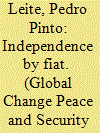

|
|
|
|
|
| Summary/Abstract |
Western Sahara and Timor-Leste (East Timor) are twin cases marking an incomplete end to the era of decolonization. The two are remarkably similar: they are former European colonies with peoples who had been promised self-determination only to be invaded within weeks of each other in late 1975 by neighboring states, themselves recently decolonized. Decades would pass while the international community stood by. The people of Timor-Leste eventually achieved freedom against the odds while most of Western Sahara and half the Saharawi people remain under foreign occupation, the scene of established human rights violations and the ongoing export of natural resources. For 25 years, Morocco has refused the Saharawi people a referendum, with the United Nations organization unable to respond as a result of a threatened veto by some permanent members of the Security Council. However, a Saharawi state arguably has come into being, enjoying popular legitimacy, governing institutions and accepted control over a part of Western Sahara. Moreover, regionally and within the African Union, the Saharawi Republic enjoys broad recognition and advocacy for its people. While drawing on lessons from the comparative experience of self-determination in Timor-Leste, this paper contends that the UN should follow the example of the African Union and welcome the Saharawi Republic as a member state. To achieve that result, a wider recognition among states is needed. The UN General Assembly, by employing its 1950 Uniting for Peace resolution, can decide to ‘consider the matter immediately' and compel a breakthrough which the Security Council has so far not been able to deliver.
|
|
|
|
|
|
|
|
|
|
|
|
|
|
|
|
| 3 |
ID:
142668
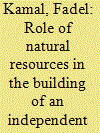

|
|
|
|
|
| Summary/Abstract |
The Saharawi Arab Democratic Republic (SADR) is a founding member of the African Union (AU) and is the sovereign governing authority in Western Sahara. The SADR government believes that the territory's significant natural resources will play an important part in the development of a viable, self-reliant and democratic nation which will contribute to peace, stability and progress of the Maghreb region. The paper examines the SADR's efforts to manage its natural resources through the establishment of the SADR Petroleum and Mines Authority, the launch of licensing rounds, its claim to an exclusive economic zone in the Atlantic Ocean and the recent enactment of a Mining Code. The paper discusses the SADR's efforts to protect its natural resources in a territory that is under occupation, and examines the SADR oil and gas licensing rounds as an example of SADR's assertion of sovereignty. The SADR natural resources strategy has two basic goals: to deter Morocco's efforts to exploit the country's natural resources and to prepare for the recovery of full sovereignty.
|
|
|
|
|
|
|
|
|
|
|
|
|
|
|
|
| 4 |
ID:
142663


|
|
|
|
|
| Summary/Abstract |
The westernmost corner of Algeria, near the border with Morocco, Western Sahara and Mauritania, is a desolate and unforgiving place, where summer temperatures reach and sometimes exceed 50 degrees C. This barren plateau type of desert is known as hammada and has historically been referred to as ‘the Devil’s Garden’. It is an apt name for an environment where sustaining life is impossible without complete reliance on external support
|
|
|
|
|
|
|
|
|
|
|
|
|
|
|
|
| 5 |
ID:
142670
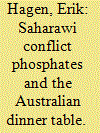

|
|
|
|
|
| Summary/Abstract |
This article describes how the investor community has intervened vis-à-vis the global fertilizer companies sourcing phosphate rock from occupied Western Sahara. The territory holds large phosphates deposits, and the export of such rock constitutes the biggest source of income for the Moroccan government in the territory it has annexed. Due to the particular nature of the conflict in that territory, such practice is associated with concerns of human rights breaches, international law violations and political controversy. A dozen companies purchase these phosphates from the Moroccan government, while their traditional and legal owners are increasingly active in trying to stop the practice. Investor engagement and company improvement are discussed with a particular focus on Australia. By the end of the 1980s, 39% of all phosphate rock in Western Sahara ended up in Australia. After a massive shareholder campaign directed at the Australian importers, the country has basically ended its dependence on such phosphate rock. The article also looks at import cases in North America. The article outlines the different arguments and strategies of investors, based on public statements and on internal dialogues between international investors and the civil society organization Western Sahara Resource Watch over the last decade.
|
|
|
|
|
|
|
|
|
|
|
|
|
|
|
|
| 6 |
ID:
142666
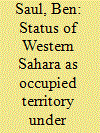

|
|
|
|
|
| Summary/Abstract |
Much of the international legal analysis of dealings in natural resources in Western Sahara has focused on its status as a Non-Self-Governing Territory, as well as the right of self-determination of the Sahrawi people. Surprisingly overlooked in the legal debates is a close examination of the application of the international law of occupation under international humanitarian law (IHL). This article considers whether and why Western Sahara is ‘occupied territory' under IHL, discussing some of the unique peculiarities that complicate the legal answer. It then considers issues of state responsibility and individual criminal liability under international law for unlawful dealings with natural resources in Western Sahara by Moroccan and foreign companies.
|
|
|
|
|
|
|
|
|
|
|
|
|
|
|
|
| 7 |
ID:
142664


|
|
|
|
|
| Summary/Abstract |
The role of natural resources in the continuing ‘question' of Western Sahara is not fully understood. In recent years, the development of the territory's resources has been at issue in efforts to arrive at self-determination for the Saharawi people. Misconceptions about the effect of such development persist, however, because of a lack of credible information and limited analysis of the connection of resources to the stalled process of self-determination and the territory's occupation. The present analysis surveys the history, problems resulting from and consequences of the exploitation of resources in a Western Sahara that has for 40 years been under armed occupation. It begins with Spain's colonizing of Western Sahara and involvement with its resources before turning to the territory's abandonment to Morocco and Mauritania following which Spain retained some resource rights. Revenue from extraction of the two primary resources since 1975 is then assessed and compared to the costs to occupy Western Sahara. The relevant international law is considered, including the right of non-self-governing peoples to sovereignty over natural resources, and the application of international humanitarian law. Rationales for Morocco's extraction of resources are examined, the evidence revealing that the activity is pursued as a basis for the settlement of Moroccan nationals in the territory to better serve an ostensible annexation project, and generate acceptance for territorial acquisition in the organized international community. The prospects for application of the law and the place of natural resources in the resolution of the question of Western Sahara are finally contemplated.
|
|
|
|
|
|
|
|
|
|
|
|
|
|
|
|
| 8 |
ID:
142665
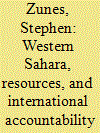

|
|
|
|
|
| Summary/Abstract |
The illegality of facilitating the exploitation of natural resources by an occupying power in non-self-governing territories is well-established in international law, yet – as in such cases as Namibia and East Timor – the legal principles are often overlooked by foreign corporations and their governments. The resource-rich territory of Western Sahara, under Moroccan occupation since 1975, is no exception, as European, North American, and Australian companies have sought to take advantage of lucrative fishing grounds or mineral deposits. While some have tried to claim that such resource extraction is legal since Morocco reinvests the money it receives into the territory through ambitious development programs, the benefits of such ‘development' have largely gone to Moroccan settlers and occupation authorities, not the indigenous population. As with Namibia and East Timor, it may fall to global civil society to pressure such companies, through boycotts and divestment campaigns, to end their illegal exploitation of Western Sahara's natural resources.
|
|
|
|
|
|
|
|
|
|
|
|
|
|
|
|
|
|
|
|
|